
Not all parents in the United States work 9 a.m. to 5 p.m., Monday to Friday.
The After Hours Child Care Act would address child care gaps for parents who work nontraditional hours in their professions, including police, firefighters, service workers, custodial staff, care workers and hospital staff.
U.S. Reps. Ashley Hinson of Iowa, Elise Stefanik of New York, Mark Pocan of Wisconsin and Suzanne Bonamici of Oregon introduced the legislation in May 2023. The U.S. Senate companion legislation was introduced in March 2023 by U.S. Sens. Maggie Hassan of New Hampshire and Todd Young of Indiana.
U.S. Rep. Abigail Spanberger of Virginia supports the legislation to improve access to affordable child care for families.
“Many Virginia parents work jobs outside of 9am to 5pm — like our police officers, firefighters, service workers, custodial staff, and hospital staff, to name a few. These hardworking Virginians keep our country and Commonwealth strong, but their nontraditional work hours often prevent them from accessing necessary child care,” Spanberger said. “No Virginia parent should have to decide between going to work and making sure their child is cared for, which is why I’m proud to join this commonsense legislation that would provide peace of mind for Virginia families by addressing these child care gaps.”
The After Hours Child Care Act would expand Child Care and Development Block Grant (CCDBG) eligibility to serve families who work outside of the traditional work hours of 9 a.m. to 5 p.m. The legislation would support efforts to expand on-site child care programs in the workplace by expanding existing child care programs or establishing new facilities so parents who work nontraditional hours can remain in the workforce and provide for their families.
“Effectively addressing the nation’s childcare crisis is critical to maintaining a stable workforce. Unfortunately, the needs of working families are not uniform and require innovative and flexible solutions,” said Linda Smith, Director, Bipartisan Policy Center’s Early Childhood Initiative. “The need has never been greater than it is for hard-working families whose shifts require them to be on-site during non-traditional hours, especially for our first responders, hospital workers, manufacturers, and those in the service industry.”
Specifically, the After Hours Child Care Act would:
- Expand capacity for an existing child care program to serve families working nontraditional hours;
- Support efforts to establish an on-site child care program at a workplace;
- Ensure that federal funds supplement existing efforts by requiring a 25% match; and
- Require a report every two years on the bill’s effectiveness in improving childcare availability.
“Nearly 43 percent of parents in the U.S. work outside the hours of 9-5, making access to affordable child care that much more difficult to find,” First Five Years Fund Executive Director Sarah Rittling said. “Oftentimes parents working nights and weekends make up the workforce that keep our country running, safe, and healthy – but too many of them struggle to go to work or do their jobs because child care providers don’t have the resources or the staff to stay open past traditional working hours.”
The Child Care Development Block Grant (CCDBG) administers funds to states, territories and tribes to provide financial assistance to low-income, working families so they can afford quality child care services. The grant pairs state and federal funds to award funding to child care providers to build the child care workforce and improve the overall quality of care. In Virginia, CCDBG serves 607,099 children under 6 years old and provides subsidies to 1,927 child care providers.










